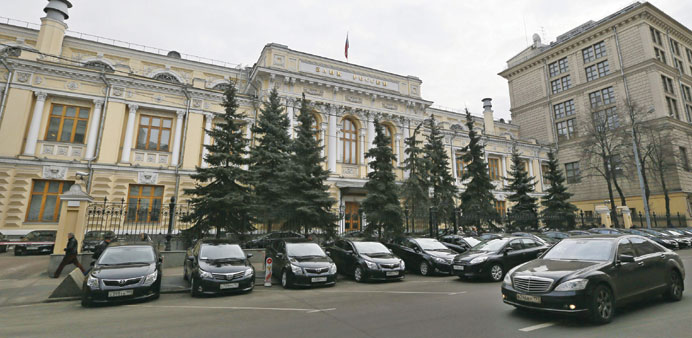An exterior view of the Russian central bank building in Moscow. The Bank of Russia kept rates unchanged in September for the first time this year, cautioning on inflation risks after consumer price growth quickened to 15.8% in August, before slowing slightly in September.
Bloomberg
Moscow
Russian government bonds rose, extending the longest stretch of weekly gains since 2010, as the rouble’s rally boosted speculation the central bank will resume interest-rate cuts to shore up the economy.
Yields on the nation’s five-year local-currency debt fell 22 basis points to 10.23%, bringing the drop in the past five days to 36 basis points as bonds gained for the eighth straight week.
Forward-rate agreements suggest the Bank of Russia will lower interest rates in the next three months, marking a reversal in expectations after policy makers kept borrowing costs on hold on September 11 to avoid stoking inflation as the rouble tumbled.
Since then, the currency has gained 10% against the dollar amid a revival in emerging-market risk appetite, giving the central bank more room to continue an easing cycle that aims to lessen the blow of the country’s worst recession since 2009.
Policy makers will lower the 11% benchmark borrowing rate by 25 to 50 basis points at their October 30 meeting, according to Ashmore Group’s Jan Dehn.
“There is no doubt that there will be plenty of rate cuts to come in Russia, so it is only a question of timing,” Dehn, the head of research at London-based Ashmore, said by e-mail.
The rouble’s advance since August has “sharply” increased the odds of a rate cut and helped boost demand for Russian local bonds, he said.
The rouble gained 0.1% to 61.34 per dollar Friday in Moscow, after earlier falling as much as 1.2%.
The currency is up 6.5% in October, the third-best performer among 24 emerging-market peers. Brent crude, the grade used to price Russia’s main export blend, climbed 0.4% to $49.94 per barrel.
The Bank of Russia kept rates unchanged in September for the first time this year, cautioning on inflation risks after consumer price growth quickened to 15.8% in August, before slowing slightly in September.
Local government bonds, known as OFZs, have handed investors a 27% return in dollar terms in 2015, the best among developing countries tracked in a Bloomberg gauge.
While “a good amount” of rate cuts are already priced into OFZs, which are “fairly-valued,” if the Russian economy stabilises and inflation slows, yields could move lower over the next one to two years, Alexander Moseley, a senior money manager and sovereign specialist for emerging-market debt at Schroders in New York, which oversees $120bn in fixed-income assets, said in an interview.
Forward-rate agreements suggest the Bank of Russia will reduce rates by 35 basis points in the next three months, the biggest bets since July.
The Micex Index of stocks retreated 0.9% on Friday, following three days of gains.
Food retailers Magnit and Lenta declined after Lenta cut its 2015 sales growth target to between 29 and 33% from 34 to 38%, citing the volatile economic environment.
“Investors are concerned that amid the recession and drop in the population’s income, retailers won’t be able to continue demonstrating good results,” Vitaly Isakov, a money manager at Otkritie Asset Management in Moscow, said by e-mail.

